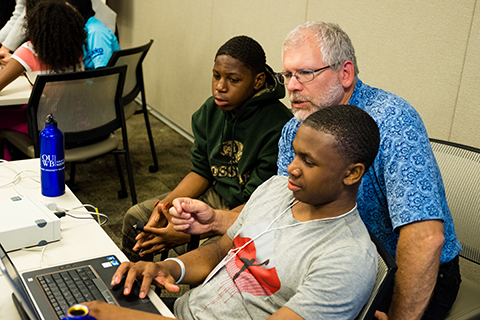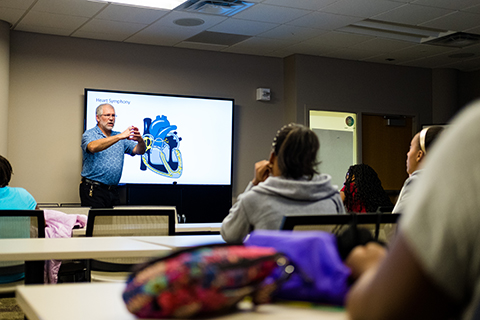
Since the Detroit Area Pre-College Engineering Program (DAPCEP) began in 2016, OUWB Foundational Medical Studies faculty members have been heavily involved with helping to introduce middle school students who are interested in health and STEM careers to the anatomy and physiology of the human body through hands-on activities and face-to-face interaction. This unique course aims to engage students, who are considered underrepresented in medicine, and provide them with opportunities and resources they might not otherwise have access to, and keep them on track through degree completion.
Professors teach a variety of topics ranging from anatomy to physiology to bioethics. Students also spend a segment on career exploration and college preparation, which intends to expose these kids to the multiple pathways that might lead to a career in medicine and health care.
Thomas Ferrari, Ph.D., assistant professor of Physiology and Neuroscience, taught students about electrical activity in the body – specifically, how muscles, nerve cells and the heart all use electrical signals – by having students record electrical activity from their own muscles and heart. “The goal is to convey how important understanding electrical activity is in the discipline of physiology,” he said. “Hopefully, the students will walk away with an awe and appreciation for what their own body is constantly doing without them having to think about it.”
Ferrari donates his time and knowledge to the program simply because it is an opportunity to educate students about science and medicine in an empowering and awe-inspiring way. Also – he finds something special in teaching children.
 |
| OUWB Foundational Medical Studies assistant professors Thomas Ferrari, Ph.D., (pictured here) and Jickssa Gemechu, Ph.D., enjoy sharing their passion for science and anatomy during the summer months with middle school students enrolled in DAPCEP. |
Further, teaching students from DAPCEP allows professors to minimize barriers and misconceptions about science and medicine for them. “Hopefully, those of us involved in the DAPCEP program can 'normalize' their views about these fields, so that they and their families will both seek medical care when needed and possibly seek further education in these areas,” he says.
Ferrari’s colleague, Jickssa Gemechu, Ph.D., assistant professor of Anatomy and Embryology taught an anatomy session that focused on the anatomy of the heart, blood and blood circulation and the anatomy of the nervous system. After teaching an introduction on these topics, Gemechu took questions, allowed students time to work on engaging activities using coloring sheets, balloons and candy, and finished the day with a round of Jeopardy.
“For me, the most rewarding thing about teaching middle school kids is that you have to keep the session fun,” Gemechu says. “Fun that is focused on important concepts in anatomy in an engaging and motivating environment to prepare them for more complex concepts and a future career in the field of medicine.”
Gemechu’s favorite part of the program is seeing the motivated, honest faces of the children involved. “Looking in the eyes of the kids who are very eager to know about the brain and viewing their emotional reactions when I ask them to hold a preserved human brain is such rewarding experience,” he says. “I am so happy to volunteer every year.”

